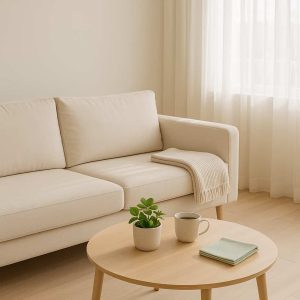 We often think of cleaning as a chore, something to get through, rather than something that can help us feel better. But there’s more to a clean home than appearances. The way we maintain our surroundings, especially the spaces where we relax, can directly impact how we think and feel. Using effective couch cleaners, for instance, does more than improve how a room looks it can refresh the atmosphere and even uplift your mood.
We often think of cleaning as a chore, something to get through, rather than something that can help us feel better. But there’s more to a clean home than appearances. The way we maintain our surroundings, especially the spaces where we relax, can directly impact how we think and feel. Using effective couch cleaners, for instance, does more than improve how a room looks it can refresh the atmosphere and even uplift your mood.
Our brains crave order. When our environment is cluttered or dirty, it creates a visual and mental noise. Studies in environmental psychology have shown that clutter increases cortisol levels, the body’s primary stress hormone. The brain processes disorder as unfinished business, triggering a low-level sense of tension.
Dirty or stained upholstery is a subtle but powerful contributor to this effect. A couch with visible spots, pet hair, or lingering odors sends constant signals of disorder. You may not consciously notice it every time you sit down, but your brain does. Over time, that background stress adds up.
In contrast, clean, fresh-smelling furniture sends the opposite message. It signals safety and care. The space feels contained, predictable, and calm, qualities that are deeply reassuring to the nervous system.
Comfort Starts with the Senses
Smell is one of the strongest links to emotion. When upholstery is clean, the absence of musty or stale odors helps create a sense of freshness and comfort. This isn’t just about preference; it’s physiological. Scent cues the limbic system, the part of the brain that regulates emotion and memory. A fresh-smelling home can lower anxiety simply because the brain associates cleanliness with safety and well-being.
Touch also plays a role. Clean fabric feels smoother and more pleasant under the skin. When you sit or lie on upholstery that’s free of dirt or residue, your body can fully relax. That physical comfort feeds back into your mental state. You’re not distracted by stickiness, roughness, or worry about what might be hiding in the fibers. Instead, your senses are free to rest.
Control and the Calm of Routine
Anxiety often stems from feeling powerless or overwhelmed. Cleaning is one of the simplest ways to restore a sense of control. It’s a tangible act with visible results. When you vacuum your couch or remove a stain, you turn chaos into order. That sense of mastery, even over small things, can quiet anxious thoughts.
Keeping upholstery clean can become part of a soothing routine. The act of brushing off crumbs, wiping down fabric, or scheduling regular professional cleanings can serve as a grounding ritual. These repetitive, mindful tasks engage the body and quiet the mind, much like meditation or gardening.
Psychologists call this “behavioral activation,” taking small, positive actions to shift mood and mindset. It’s not about perfection; it’s about participation. Each cleaning session reinforces the message that you’re capable of shaping your environment, which in turn supports emotional stability.
The Visual Power of Order
Visual cues strongly influence mood. Spaces that look tidy and harmonious help the brain rest. In design psychology, this is called “cognitive fluency,” the ease with which the mind processes information. When a space is clean and visually balanced, it feels safe and predictable. The eyes can move across the room without catching on disorder.
Upholstery is central to this sense of order because it often dominates a room’s visual field. A spotless sofa or chair instantly makes a space feel cared for, while a stained or sagging one disrupts that balance. Even small visual improvements, like fluffing pillows or smoothing out wrinkles, can make a surprising difference in how calm a room feels.
Cleanliness as Self-Respect
There’s also an emotional dimension to clean upholstery that goes beyond stress reduction. Taking care of your environment is a form of self-respect. It sends the message that you deserve comfort and care. When your living space reflects that mindset, it reinforces a positive self-image.
People who struggle with anxiety or depression sometimes let cleaning slide, not because they don’t care, but because they feel overwhelmed. In those cases, starting small — like cleaning one chair or cushion — can be a gentle way to rebuild momentum. Each small act becomes a statement: I’m taking care of myself.
The Ripple Effect of a Clean Environment
Clean upholstery doesn’t exist in isolation. When one part of the room feels fresh, it often inspires more care elsewhere. You notice the dust on the table, straighten the books, or open the curtains to let in more light. That ripple effect helps create a more peaceful and supportive environment overall.
There’s a feedback loop at work: clean surroundings lower anxiety, and lower anxiety makes it easier to maintain clean surroundings. Over time, that loop builds resilience. Instead of seeing cleaning as a never-ending battle, it becomes a form of emotional maintenance, something that supports your well-being rather than drains it.
Final Thoughts
A tidy space won’t solve every problem, but it can make the hard days easier to face. Clean upholstery, in particular, offers both physical comfort and psychological relief. It reminds us that small, practical actions can have a real emotional impact.
So next time you vacuum the couch or treat a stain, don’t think of it as busywork. Think of it as self-care in disguise, a simple, mindful act that helps your home and your mind breathe a little easier.